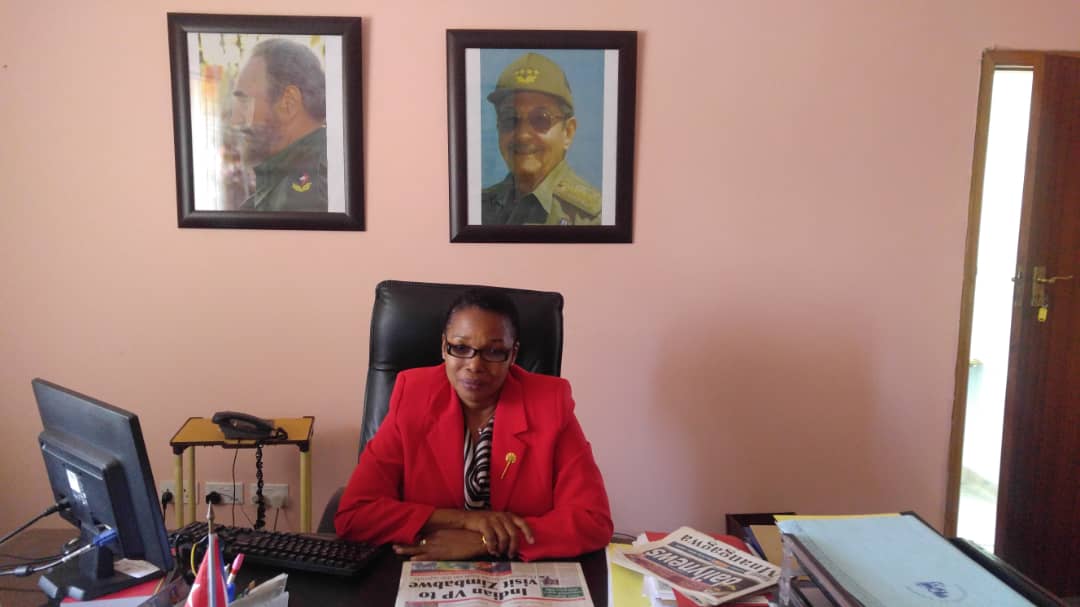By Byron Mutingwende
Cuba’s Ambassador, Her Excellence Carmelina Ramirez Rodriguez has said her country enjoys a long-standing relationship with Zimbabwe and urged the Southern African country to remain resolute as it works towards development.
In an exclusive interview with Spiked Online Media, Ambassador Rodriguez said the relationship between the two countries that date back to before independence should be strengthened.
“We helped Zimbabwe during its war of liberation. After independence the strong cooperation was mainly on education and health. We offer education to Zimbabwean students at different institutions and locations in Cuba. We have trained Zimbabwean doctors and engineers, among various other disciplines,” Ambassador Rodriguez said.
She said Cuba has a cooperation agreement with Bindura University where it played a role in developing the institution into a science university. Up to now there are Cuban professors and lecturers at Bindura University.
Every two years, Cuba renews contracts for lecturers of mathematics, physics, ICT and Spanish.
“At Bindura university there is a department of foreign language teaching Spanish. We are waiting for seven more lecturers for different specialties. I attended the 17th graduation for Bindura University where President Mnangagwa was there as the Chancellor and Guest of Honour.
“The other area of greater cooperation is the medical field. We have 37 medical doctors deployed countrywide in places like Mutare, Masvingo, Bulawayo, Chinhoyi, Chitungwiza and Harare. We are saving lives. When I presented my credentials President Mnangagwa praised Cubans for their high discipline and work rate. Most of our people are ready to work in the rural areas.”
In the Cuban medical team in Zimbabwe are professionals who have helped the people of Liberia during the Ebola outbreak. They go where the need is. This medical cooperation has been in place since 1987. The Cuban Ambassador said her country is looking forward to increasing the number of medical doctors in Zimbabwe.
Ambassador Rodriguez said the Cuban revolution made a lot of advances particularly in the education and health sectors. Education in Cuba is free from primary up to university level in spite of class, race or gender.
Cuba is tremendously developing its tourism and the Ambassador urged Zimbabwe to work in the same spirit to develop their own country despite criticism and international isolation in some instances
“Cuba came from an agricultural economy where it was anchored on sugar cane production. Tourism is now the mainstay of the economy. We make joint-venture investments (49% foreign and 51% local). Over the last 20 years, we have increased the number of the hotels since we have many coastal areas and beaches.
“We have kays with beautiful conditions for tourism. Every year we receive over 4 million tourists because apart from good natural conditions, we have social security, very educated people and high levels of hospitality. Tourists do repeated visits to our country. Cuba is not developing as it should because of the American economic, financial and commercial blockade that has lasted for 54 years. The blockade does not permit American citizens to travel to Cuba because of ideological differences,” Ambassador Rodriguez added.
On Wednesday, the 31st of October 2018, Cuba will present a resolution at the United Nations to put an end to the blockade. For 20 years, the international community is voting against the blockade except United States and Israel.
“We hope that the international community will vote agin in favour of Cuba. The blockade does not only affect Cuba but also some third world countries. In Zimbabwe, Stanbic Bank closed our account without compensation because they are scared to be targets of US sanctions.
“In spite of the blockade, we could develop our country through our people’s hard work. We presented one of the best figures in the world about the participation of women in society.”
In Cuba, women represent 60,5% of all higher education graduates; 67,2% of technicians and professionals; 48,6% of executives; 81,9% professors, teachers and scientists; 80% of district attorneys, chief judges in the provincial courts, professional judges and the labour force in the sectors of health and education; 53% Parliamentarians while 53, 22% are deputies in different organisations.
Cuba dedicates half of the annual budget towards health, education and social welfare programmes. It has reduced child mortality rates to less than 4 per 1000 live births. In 2013, maternal mortality was just 21 per 100 000.






